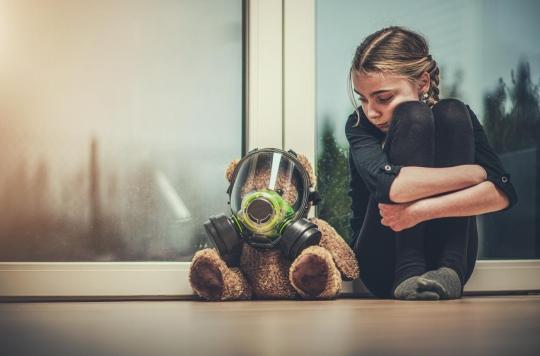Like sexual or domestic violence, war events can have deleterious effects on the mental and physical health of children, and have serious consequences for their future.

- Childhood trauma can change how a person sees the world
- Adults who were traumatized in childhood are more susceptible to anxiety or depression if exposed to retraumatization
Since the start of the conflict in Ukraine a week ago, nearly a million refugees have fled the country, reveals the UN in a report. Among the first victims of this conflict are, of course, children. Even more than adults, children risk being permanently marked by this forced exile, by the sound of bombs and by the fear they feel on a daily basis in the face of the violence of war.
These psychological traumas are all the more damaging as they occur when their little brain is in full construction and has not yet reached the maturity necessary to understand all the events they are going through, warns Arash Javanbakht, associate professor in Psychiatry at Wayne State University (USA).
In an article published on the website The Conversation, dedicated to sharing ideas between academic experts and the general public, the psychiatrist highlights the lasting effects on the mental and physical health of children exposed to war. “To understand the child’s reaction, one must keep in mind his level of emotional and cognitive development and maturity. Most of the time, confusion prevails.”he recalls.
A continuous feeling of guilt
Childhood trauma is not trivial. For Professor Javanbakht, they even risk forever changing the perception that children have of the world, and therefore determining the way they behave. For example, he underlines the risk for the traumatized child of “perceiving oneself as unlovable, guilty or evil”. “At this point in his development, his brain may be thinking, ‘If someone is doing this to me, there’s something wrong with me, and I deserve it’.”
This is the case in times of war, but also when the child is a victim or a witness of sexual or physical violence. “In cases of sexual violence, sometimes parents, when informed, choose to deny or ignore what happened. This aggravates feelings of guilt and helplessness.” “They deduce that the world is a brutal and insecure place, where one is either violent or mistreated”adds Professor Javanbakht.
Long-term physical and mental health risks
Not only do these traumas irreparably alter children’s view of the world, but they expose them to risks that may have an impact on their future: lower grades in class, higher anxiety, risk of depression, drug addiction, development of diseases autoimmune…
“Adults who experienced childhood trauma are more likely to develop post-traumatic stress disorder when exposed to retraumatization and have higher rates of anxiety, depression, substance abuse and suicide. The consequences of childhood trauma on adult physical health include obesity, chronic fatigue, cardiovascular disease, autoimmune disease, metabolic syndrome, and pain, among others.”details the psychiatrist.
However, he emphasizes that children, like adults, have capacities for resilience, which can be encouraged by various means of action in our society, such as poverty reduction and better access to education. It is also essential to take seriously the abuse reported by the child, to remove him from the traumatic environment and to set up psychotherapies or drug treatment.
.















